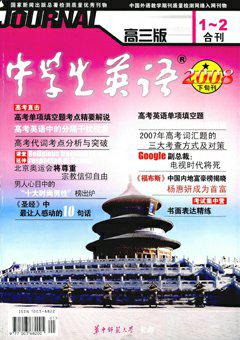高考单项填空题考点精要解说
马 静
一、 命题依据及考纲解读:
命题依据:
自1996年以来,在新的外语教学理念影响下,新的单项填空测试理念已经确立。2007年考试大纲英语学科将体现出如下命题依据:
(1) 命题原则保持一致。语言知识题保证知识覆盖面,尽可能增加综合性与语境化的因素,强调语言运用。
① 语言必须放在实际的并尽可能不同的情景中运用;
② 语言必须适合具体的交际行为;
③ 考核的焦点在于是否达到了交际目的;
④ 语言交际行为除了需要语言能力外,还需要一些其它的能力;
⑵ 题型结构相对稳定;
⑶ 试卷难度保持一致;
⑷ 强调语言测试的交际性原则,加大对语言交际能力的考查。
二、 考纲解读:
许多省份2008届毕业生使用的是新教材和新课标。新教材与传统的教材相比其特点是:文章的话题丰富多彩,功能意念项目更加具体,课文中的难句、长句和惯用句型屡见不鲜。词汇量大,大约在三千五百个左右;有大量的词汇是传统教材中未曾出现过的。语法项目的分布也非常系统、科学。那么适应于这套教材的2008年高考将会怎么样呢?《2007年普通高等院校招生全国统一考试英语科考试大纲》在“语言知识”方面,要求考生“能适当运用基本的语法知识,掌握词汇量3500个,而过去高考只要求掌握2500个,词汇量增加了1000个。”通过分析2006年和2007年的全国及各省的高考英语试题可知,高考单项填空主要是从以下几个方面检查考生的英语水平:
(1)基础语法知识;
(2)语法知识的运用能力;
(3)词组的搭配和习惯用法;
(4)对词义的正确理解。
三、 命题特征:
1. 强调语言的交际性和真实性, 突出语境的作用,提供语境,间接考查语言知识的运用。
重视语言交际,专门测试口语表达的试题以对话形式出现较多, 与去年相同约占 20%,这些题干体现了较强的口语化特征,创设了简洁真实的语境,为解题提供了必要的信息。强调基础, 在真实的语言环境中考查语法和词汇的基础知识, 体现了内容综合化和题型交际化的原则。几乎所有的试题都设置了微型语境,几乎没有单纯考查语法知识的试题。为了保证语境设置的充分,本节15个小题的题干形式全部使用了对话、并列句、复合句等较为复杂的句式结构,没有单纯的简单句。命题者巧设语境,置语法知识的考查于情景之中,突出了对应用能力的考查。
2. 重视基础知识,顾及全体考生。
旨在考查考生对最基础的语法知识、句型、短语和词汇的用法掌握了多少, 而不是考查考生还有什么知识没有掌握。紧扣大纲及课本测试的语言点,基本上没有超出教学大纲规定的内容和课本中的内容,总的说来较为容易。若课文熟悉,题目做起来十分容易。例如:
NMET2002单项选择的一些题与教材中的内容在用法和结构上相似。现选择一些例子作一比较并加以分析。
(NMET 2002) Having a trip abroad is certainly good for the old couple, but it remains__B__whether they will enjoy it.
A. to see B. to be seen
C. seeing D. seen
教材中的句子:
A lot of work remains to be done in the office. (L8 SB Ⅱ)
(NMET 2002) Meeting my uncle after all these years was an unforgettable moment, __B__I will always treasure.
A. that B. one C. it D. what
教材中的句子:
He had the idea of organizing two big pop concerts on the same day, one in England and one in the USA. (L103 SB Ⅰ)
Chaplin had developed his own manner of acting, the one that was to become world famous. (L18 SB Ⅱ)
3. 句子较长,结构复杂,一题多点,使试题的区分度比较明显。
题干加长,有的从句套从句,加大了试题的信息量及难度。
4. 体现了淡化语法规则偏重阅读理解的趋势。
5. 体现了选拔功能,虽然绝大部分题目紧扣教材,不偏不难,但也出现个别“偏题怪题”。但这类试题能让考生拉开分数档次,更好地体现了高考的选拔功能。
6. 测试重点突出。
强调对动词用法的考查,15个小题中测试动词的题占了一大半,包括动词时态、非谓语动词、助动词、情态动词、动词辨义等。其次是对从句的考查,也就是说既注重了面又强调了点,重点内容每年都考,且占很大比例。
7. 材料来源规律:
(1) 有的高考试题是取自往届的高考试题阅读理解文章中的原句。如:
(NMET 2000) Most animals have____little connection with animals of__B__different kind unless they kill them for food.
A. the; a B. 不填; a
C. the; the D. 不填; the
Most animals have little connection with animals of a different kind unless they kill them for food. (1996年全国卷阅读理解C篇第一句话)
(2) 原封不动地来源于权威的外文词典。如:
有的高考试题是取自以英语为本族语的人编写的《牛津高级英汉双解词典》和《朗文英汉双解词典》等权威词典。略举两例如下:
(2003 北京) They had a pleasant chat__D__a cup of tea.
A. for B. with C. during D. over
They had a pleasant chat over a cup of tea. (见《牛津高阶英汉双解词典》的over词条)
(NMET 1998) Why do you want a new job__D__youve got such a good one already?
A. that B. while C. which D. when
Why do you want a new job when youve got such a good one already? (见《朗文英汉双解词典》的when词条)
(3) 来源于对往届高考题的改造。如:
2004年全国卷(Ⅰ)考查it作形式宾语的第27题就是模仿1998年的一道题。请对照:
(2004全国Ⅰ) I like__C__in the autumn when the weather is clear and bright.
A. this B. that C. it D. one
(1998全国) I hate__A__when people talk with their mouth full.
A. it B. that C. these D. them
(4) 来源于对词典句子的改造。如:
NMET2003的第31题就是对《朗文当代高级英语辞典》中break down词条下的例句扩充改造而成。请对照:
(2003全国) News report says peace talks between the two countries__A__with no agreement reached.
A. have broken down B. have broken out
C. have broken in D. have broken up
The peace talks broke down without any agreement being reached. (《朗文当代高级英语辞典》)
(5) 来源于对教材句子的模仿。如:
2004年辽宁卷的第26题就是模仿高三教材中的第26课的最后一个句子造出来的。请对照:
(2004辽宁) Maybe you have been to many countries, but nowhere else __A__such a beautiful place.
A. can you find B. you could find
C. you can find D. could you find
(6) 来源于优秀的教辅资料和工具书。如:
2004年全国卷Ⅱ的第25题和天津卷的第28题就是分别根据蒋小青等编写的《高考英语单项填空与完形填空》中“动词时态”一节的“考点预测”第10题和第11题略微加工而来。请对照:
(2004四川) —Has Sam finished his homework today?
—I have no idea. He__C__it this morning.
A. did B. has done
C. was doing D. had done
—Has your sister finished her composition yet?
—I have no idea. She__D__ it this morning.(《高考英语新单项填空与完形填空》)
A. had started B. started
C. have started D. was starting
(2004天津) —What were you doing when Tony phoned you?
—I had just finished my work and__D__to take a shower.
A. had started B. started
C. have started D. was starting
—What were you doing when I phoned you last night?
—I__C__my painting and was starting to take a bath. (《高考英语新单项填空与完形填空》)
A. have already finished
B. was finishing
C. had just finished
D. was going to finish
(7) 来源于某些省市的模拟试题。如:
2004年福建卷的第26题就是直接取自江苏部分重点中学高三第二次调研考试的第26题。请对照:
(2004福建) Id like to buy a house—modern, comfortable, and__B__in a quiet neighborhood.
A. in all B. above all
C. after all D. at all
(江苏二调) I should like to rent a house, modern, comfortable, and__C__in a quiet neighborhood.
A. over all B. in all
C. above all D. after all
8. 题干创新规律:
近几年的单选题的题干创新力度在逐步加大,迷惑性不断增强。这主要表现在两个方面:一方面更喜欢采用对话的形式,语境化更为明显,致使一些解题的有效信息更加隐藏;另一方面是通过加入插入语(如of course, I think, do you think等)、定语从句或打乱正常语序等方式使句子结构复杂化。
(1) 题干中加入插入语。
(2004天津) Helen was much kinder to her youngest son than to the others, ______, of course, made the others envy him.
A. who B. that C. what D. which
说明: 答案选D。句子的基本结构为Helen was much kinder to her youngest son than to the others,made the others envy him. 题干中加入of course这一插入语后,难度便大大地增加了。
(2) 题干中加入定语从句。
Does the way you thought of______the problem make any sense?
A. settle B. settled
C. settling D. to settle
说明: 答案选D。此题在the way to settle the problem中加入了定语从句(that) you thought of,大大增加了此题的迷惑性,以致使考生误以为介词of后面接要doing而选C。
(3) 隐藏补语的宾语或主语。
(NMET 2000) The managers discussed the plan that they would like to see______the next year.
A. carried out B. carrying out
C. carry out D. to carry out
说明: 答案是A。此题中see的宾语为替代the plan的that,因为较为隐蔽,考生选出正确答案的难度较大,若写成They would like to see the plan____.我们不难选出正确答案是A。
(NMET 1992) The salesman scolded the girl caught________and let her off.
A. to have stolen B. to be stealing
C. to steal D. stealing
说明: 答案是D。句中let her off与scolded the girl是并列谓语,caught stealing是过去分词短语作定语,相当于who was caught stealing,其中stealing是主语who的补足语。但这个主语是隐藏的,若不仔细分析,很难选出正确答案是D。
(4) 打破句子的正常结构。
(2004浙江) Anyway, that evening, ______Ill tell you more about later, I ended up staying at Rachels place.
A. when B. where C. what D. which
说明: 答案是D。此题中that evening本来是和I ended up ... 句在一起的,它在主句中作状语,在从句中作about的宾语,但命题人却将它提前,迷惑性大增,不少同学以为that evening是先行词而误选A。
9. 语境设置规律:
(1)文化差异不断重现。
命题人故意利用中西方思想文化的差异来设置语境,让你步入习惯思维的陷阱。如下面的题考生很容易按照中国人的习惯思维而误选B,事实上正确答案是A。
—I think you should phone Jenny and say sorry to her.
—__A__. It was her fault. (NMET 2003)
A. No way B. Not possible
C. No chance D. Not at all
(2)有效信息更加隐蔽。
题干的设置水平和灵活性逐年提高,有关信息不仅存在于句子的表面,也可能存在于字里行间,或者存在于一个不引人注意的某个单词上。如:
I had to buy____these books because I didnt know which one was the best. (2004上海)
A. both B. none C. neither D. all
说明: 答案是D。此题要求考生确定用表示“两者”还是“多者”的限定词,题干中没有明显表示数量的词语,但the best却暗含指多者,由此可确定答案是D。
(3)口语色彩更加浓厚。
由于有特定的语境,口语经常使用省略,较书面语简洁明快。近年来的高考单项填空题的口语色彩日渐浓厚。如:
—Susan, go and join your sister cleaning the yard.
—Why____? John is sitting here doing nothing. (NMET 2003)
A. him B. he C. I D. me
说明: 答案是D。此题考查口语的简略答语中用人称代词的宾格代替主格的用法。答案选D。

